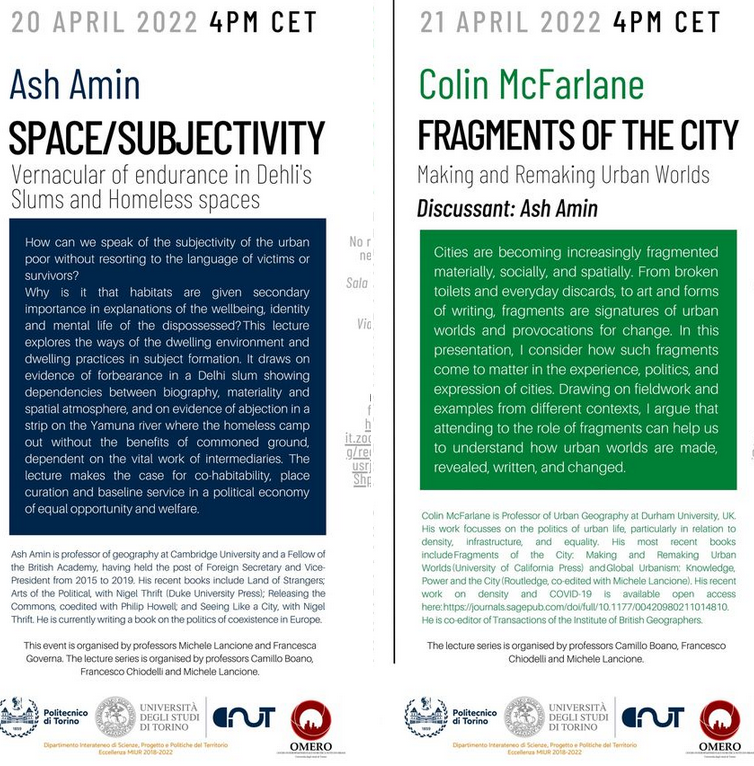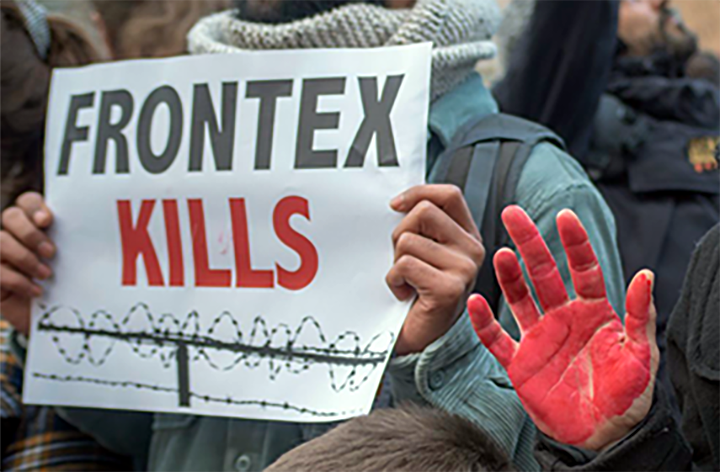The Polytechnic has decided to continue the agreement of service between DIST-Ithaca-Polito and Frontex (back story, here). After a meeting of the academic Senate on the 14th of December, the newspaper La Stampa reports that
At the end of the debate it was decided by a large majority to proceed with the signing of the Consortium Agreement with Frontex. At the same time it was decided to introduce a binding clause, which specifies the commitment of both the research staff involved and the client, to act in compliance with respect for human rights and fundamental human rights, as well as the principles of integrity of research.
I wonder how my colleagues in the Senate imagine the possibility of asking Frontex to comply with human rights. There is so much evidence indicating the agency is systematically involved in pushback, which means they are not allowing asylum seekers to enter Europe, therefore impeding them to exercise their right to request asylum. There is evidence indicating the agency is passing information to the so-called Lybian Coastal guard, which ten fire against the boats of migrants in the Mediterranean sea. There is evidence of the agency misusing funds, of agency personnel harassing migrants along the Balkan route, of the agency avoiding interventions when they should be needed, and much, much more. What does “integrity of research” mean in collaborating with such an Agency?
At a personal level, fighting this deal initiated in July (as I explain here). It continued with my public letter to Altrecomia (following the article of the journalist Luca Rondi on the same magazine), and then escalated in a greater number of interviews, articles, interventions (a full list with links at the end of this post). Despite the negative result, the collective that coalesced around this struggle is not lost, and will not be lost.
I want to thank all the ones that believed in this fight. Some of them are within the academy, including within the Politecnico. There are members of the Polytechnic Senate (thank, to some of you, for your courage and intellectual honesty, in particular Daniele Marchisio and Bruno Codispoti); of the administrative services; and of several unions, who have taken a clear position against the deal (thanks in particular to Paolo Barisone). There are some colleagues who did the same – above all, I want to thank Dr. Silvia Aru, a colleague in DIST, who has been always, very clearly, against the whole affair; and I also want to thank a number of Italian and international academics, who signed public petitions making their names visible (thanks to all of you!), who organised their own texts (thanks Paola Minoia), or took time to provide concrete help and advice (thanks Chiara Rabbiosi, Chiara Giubilaro, Simone Tulumello, Maurizio Memoli and Filippo Celata, among many). Thanks, above all, to Gennaro Avallone, Margherita Grazioli, Enrico Gargiulo, and Elena Giacomelli, who help to organise, to share, and to expand the fight; to the Coordinamento Unito and the Coordinamento Polito for their support to the cause; and to Francesca Governa, Marco Santangelo, Camillo Boano, Francesco Chiodelli and Isabella Consolati at DIST, who always discussed this with me, with open minds and hearts. Thanks to my international colleagues: my comrades in FCDL and in the Radical Housing Journal, my friends at the Unequal Cities Network at UCLA, in the Journal City, and those writing supportive statements from so many other corners around the globe, including an amazing one by 30+ colleagues at my old institution, The University of Sheffield, which really helped. There are some Ph.D. students in the DIST who took clear positions too, as well as some of my own students in the MA in Geography, and my own Ph.D. students in Sheffield and Turin (particular thanks to Francesca Guarino and Saanchi Saxena), to whom I am thankful for the support and for believing in the long-term goal of this fight.
However, this has been a fight involving Academia… fought for the most by non-academics or academics without permanent jobs. I have found strength and scope in people writing to me from Palermo to Trieste, and beyond Italy, too. Workers, students, mid-school teachers, retired people, kids. I am thankful to the students that organized in Turin, including the PhDs of ADI Turin, the geography students at Unito, the Gruppo Palestina, Cambiare Rotta and the communist group at Polito. I am thankful for the autonomous realities that hosted public debates on the story, including Neruda in Turin, and to the journalists who wrote about this case and made it available to broader audiences. Above all, I want to thank Luca Rondi (Altreconomia), Francesca Spinelli (Internazionale), Teresa Paoli (Presadiretta), Giansandro Merli (Manifesto), Peter Yeung (Guardian), Frabrizio Maffioletti (Pressenzia), Marco Siragusa (EastJournal), Nicolò Arpinati (Dinamo Press), the Melitea group, and the comrades Margherita, Francesco e Maria at Radio BlackOut.
Most importantly and relevantly, I am extremely thankful to all the ones working to construct a differential way of dealing with migrations in Italy and Europe. Your care and attention to this story and to my persona have been heartfelt, and it only reaffirmed my conviction (shared with my comrades at FCDL and the RHJ) that only through horizontal solidarities and collective organising we can move meaningfully forward. You are too many to thank, and I will surely miss some. Thanks to the groups Sea Watch, ADIF – Associazione Diritti e Frontiere, Campagna LasciateCIEntrare, Carovane Migranti, Rete Antirazzista Catanese, Cobas Scuola Catania, Osservatorio Solidarietà, Torino per Moria, Borderline Sicilia, Ongi Etorri Errefuxiatuak, Progetto Meltingpot Europa and thanks also to ASGI. And deep thanks to a group of amazing individuals who really made this a collective endeavor, most especially thanks to Yasmine Accardo, Fulvio Vassallo Paleologo, Gianluca Vitale, Yasha Maccanico, Francesca Mazzuzi, Gennaro Avallone, Stefano Bleggi, Gianfranco Crua, Alfonso Di Stefano, Claudia Mantovan, Mariafrancesca D’Agostino, Maurizio Ricciardi, Barbara Sorgoni, Valeria Ferraris, Sandro Mezzadra, Stefania Spada, Giuseppe Campesi, Silvia De Meo e tant* altr*. Thanks to Leo for having been close to me the whole time.
At this point, I am more and more convinced that continuing to fight Frontex at all levels is very necessary. From my corner, I will create a safe space for critical and radical thinking around inhabitation, migrations and asylum well within DIST and the Polytechnic of Turin, and I will continue to work with my new comrades in the city to offer harbour and to create an alternative vision of what “research integrity” and “integrity” at large means. It is not time to retreat, but time to scale up. Avanti!
Interventions Frontex-POLITO at 14 December 2021
ITA–Articoli:
· Il comunicato di Polito di Luglio, con il quale la notizia è stata resa pubblica: https://poliflash.polito.it/in_ateneo/politecnico_e_ithaca_insieme_per_la_produzione_di_cartografia_per_l_agenzia_europea_frontex
· Il pezzo che ha aperto le scene, su Altreconomia: https://altreconomia.it/il-politecnico-di-torino-a-fianco-di-frontex-sul-rispetto-dei-diritti-umani-intanto-cade-il-silenzio/
· La mia lettera pubblica: https://altreconomia.it/non-a-fianco-di-frontex-chi-si-dissocia-dallaccordo-del-politecnico-di-torino/
· La campagna Fuori Frontex dalle nostre Università, nata dopo i pezzi di cui sopra: https://www.lasciatecientrare.it/non-a-fianco-di-frontex/
· Del caso ha parlato anche Repubblica Torino, lo screenshot del pezzo si può trovare qui: https://nextcloud.rinlab.org/index.php/s/xg6WNspZkD5a28N
· Il bellissimo pezzo uscito su Internazionale (in cui si parla del caso a fine testo,e contiene molti riferimenti utili per capire il problema): https://www.internazionale.it/opinione/francesca-spinelli/2021/11/04/frontex-campagna-abolizione
· Una lettera pubblica firmata dai più importanti studiosi sulle migrazioni in Italia, che è uscita sul Manifesto: https://ilmanifesto.it/lettere/fuori-frontex-dalle-nostre-universita/
· Una intervista a Luca Rondi, il giornalista di Altreconomia, che è molto utile per spiegare a chi non vede il problema perchè il tutto è problematico: https://www.meltingpot.org/Il-Politecnico-di-Torino-e-l-accordo-con-Frontex.html#.YYP6n7vTUd2
· Mia intervista al gruppo Melitea, ripresa da Mediterranea Saving Humans: https://gruppomelitea.wordpress.com/2021/11/07/la-mia-universita-lavora-con-frontex-non-in-mio-nome-intervista-al-professor-michele-lancione/#more-2597
· Lettera pubblica indirizzata ai reggenti di Politecnico, da NGO italiane, per rescindere l’accordo: https://altreconomia.it/rescindere-il-contratto-con-frontex-lettera-aperta-al-politecnico-di-torino/
· Articolo su La Stampa: https://www.lastampa.it/torino/2021/11/17/news/protesta_al_politecnico_stop_al_contratto_da_4_milioni_con_frontex_-414438/
· Lettera di supporto dal Coordinamento UniTo: https://coordinamentounito.wordpress.com/2021/11/23/e-questa-la-ricerca-di-frontiera/
· Lettera di supporto dal Coordinamento Polito: https://coordinamentopolito.wordpress.com/2021/11/20/lettera-aperta-al-politecnico-di-torino-riguardo-la-collaborazione-con-frontex/
· Articolo su Internazionale KIDS, che spiega la questione ai ragazzi. Si trova in cartaceo, o scannerizzato, qui: https://nextcloud.rinlab.org/index.php/s/5CW9CSQo6XXAodK
· Articolo di approfondimento su EaST Journal: https://www.eastjournal.net/archives/122096
· Articolo di Pressenza sull’incontro al Politecnico del 1/1/21: https://www.pressenza.com/it/2021/12/torino-fuori-frontex-dal-politecnico/
· Comunicato Lasciateci Entrare su riunione Senato per accordo: https://www.lasciatecientrare.it/frontex-e-ricerca-universitaria-qual-e-il-problema/
· Articolo de La Stampa su assemblea al Politecnico: https://www.lastampa.it/torino/2021/12/02/news/rescindete_quel_contratto_assemblea_pubblica_al_politecnico_contro_l_accordo_con_frontex-991542/
· Dossier di Cambiare Rotta: Il Progetto dell’Unione Europea sui suoi Confini: https://cambiare-rotta.org/2021/12/06/dossier-frontex-il-progetto-dellunione-europea-sui-suoi-confini/
· Altro articolo di Luca Rondi su Altreconomia: https://altreconomia.it/il-politecnico-di-torino-e-a-un-bivio-con-frontex-o-con-i-diritti-umani/
· Presa di posizione del Coordinamento Migranti: https://www.coordinamentomigranti.org/2021/12/06/fare-fronte-contro-frontex-i-migranti-e-la-lotta-sui-confini/
· Dossier del collettivo Metamorfosi: https://www.academia.edu/63947546/Analisi_di_una_committenza_Politecnico_Frontex_un_caso_di_Academic_Washing
· Lettera aperta RSU Polito sul caso Frontex, disponibile qui: https://nextcloud.rinlab.org/index.php/s/tLtzQrzdJcfp8sn
· L’Associazione per gli Studi Giuridici sull’Immigrazione (ASGI) riporta la nostra lettera: https://www.asgi.it/notizie/rescindere-il-contratto-con-frontex-lettera-aperta-al-politecnico-di-torino/
ITA–Radio, videos and public meetings:
· Intervista con Radio Blackout: https://radioblackout.org/2021/10/accordo-politecnico-frontex-dissenso-in-accademia-intervista-con-michele-lancione/
· Video di incontro con student* a Palazzo Nuovo Torino. Da min 13 a 39 Lancione spiega l’accordo. Da notare anche intervento dei compagn* di Sea Watch: https://www.facebook.com/CambiareRottaTorino/videos/403610054642077/
· Seminario a Salerno, “Non a fianco di Frontex, non in nostro nome”: https://www.disps.unisa.it/unisa-rescue-page/dettaglio/id/2547/module/488/row/17071
· Prima occasione pubblica di incontro dentro al Politecnico sul tema, con studenti, giornalisti, attivisti, avvocati: https://www.facebook.com/events/593243081942483?ref=newsfeed
· Video intervista per Pressenza: https://www.youtube.com/watch?v=F-kx5hW8FEU&t=245s
· Incontro allo spazio popolare Neruda, Che cos’è Frontex? https://www.facebook.com/events/s/che-cose-frontex/451037489924340/
ENG:
· Lancione’s letter to Altreconomia, translated into English: https://www.michelelancione.eu/blog/2021/10/24/my-university-works-with-frontex-not-in-my-name/
· AbolishFrontex: https://abolishfrontex.org/blog/2021/10/25/my-university-works-with-frontex-not-in-my-name/ e https://abolishfrontex.org/blog/2021/11/16/open-letter-to-polytechnic-university-of-turin-about-working-for-frontex/
· Statewatch: https://www.statewatch.org/news/2021/november/not-alongside-frontex-academics-speak-out-against-border-collaboration/
· Letter from the Decolonise.eu network: https://decolonise.eu/not-alongside-frontex/
· Debate on Twitter: https://twitter.com/michelelancione/status/1452507202867154946



